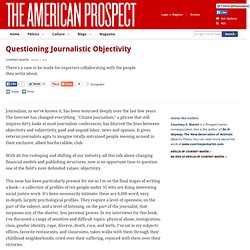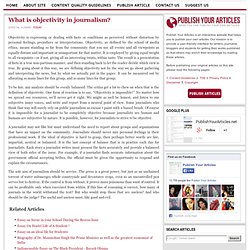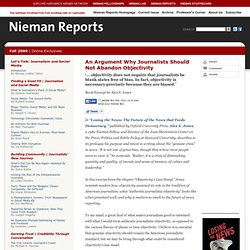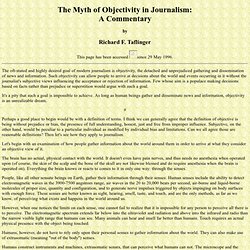

alexia jones
A definition of journalistic objectivity as a performance. Historically, journalism as a profession emerged alongside the notion of objectivity.

However, in the past decades, objectivity has been dismissed not only as an unattainable standard but also as an undesirable norm. Yet an analysis of the criticisms reveals that most scholars actually fail to define journalistic objectivity. This article tries to remedy this flaw and to suggest that journalistic objectivity is an evolving notion which can no longer be considered a synonym for neutrality or detachment. Social Norms - Michael Hechter. Questioning Journalistic Objectivity.
Journalism, as we've known it, has been mourned deeply over the last few years.

The Internet has changed everything. "Citizen journalism," a phrase that still inspires dirty looks at most journalism conferences, has blurred the lines between objectivity and subjectivity, paid and unpaid labor, news and opinion. It gives veteran journalists agita to imagine totally untrained people messing around in their exclusive, albeit hardscrabble, club. With all this reshaping and shifting of our industry, all this talk about changing financial models and publishing structures, now is an opportune time to question one of the field's most defended values: objectivity.
This issue has been particularly present for me as I'm on the final stages of writing a book -- a collection of profiles of ten people under 35 who are doing interesting social justice work. And I told them that I would show them drafts and give them a chance to give me feedback and correct inaccuracies before the pieces become public. The Handbook of Journalism Studies - Karin Wahl-Jorgensen, Thomas Hanitzsch. What is objectivity in journalism? Objectivity is expressing or dealing with facts or conditions as perceived without distortion by personal feelings, prejudices or interpretations.

Objectivity, as defined by the school of media ethics, means standing so far from the community that you see all events and all viewpoints as equally distant and important or unimportant for that matter. It is employed by giving equal weight to all viewpoints—or if not, giving all an interesting twists, within taste. The result is a presentation of facts in a true non-partisan manner, and then standing back to let the reader decide which view is true. By going about it this way, we are defining objectivity not by the way we go about gathering and interpreting the news, but by what we actually put in the paper. It can be measured out by allocating so many lines for this group, and so many lines for that group. To be fair, any analysis should be evenly balanced. Objectivity in Journalism. DAVID BROOKS There is some dispute about whether objectivity can really exist.

How do we know the truth? Well, I’m not a relativist on the subject. I think there is truth out there and that objectivity is like virtue; it's the thing you always fall short of, but the thing you always strive toward. And by the way, I think that opinion journalists have to be objective just as much as straight reporters. Opinion journalists, too, have to be able to see reality wholly and truly. What are the stages of getting to objectivity? The second stage is modesty. The same thing has to happen for journalists. The third stage of objectivity is the ability to process data — to take all the facts that you've accumulated and honestly process them into a pattern. The fourth stage of objectivity is the ability to betray friends. The fifth stage of objectivity is the ability to ignore stereotypes.
And the last bit, the sixth stage is a willingness to be a little dull. David Brooks. Copyright © 2006 Imprimis. Just the Facts: How "Objectivity" Came to Define American Journalism - David T. Z. Mindich. An Argument Why Journalists Should Not Abandon Objectivity. In “Losing the News: The Future of the News that Feeds Democracy,” published by Oxford University Press, Alex S.

Jones, a 1982 Nieman Fellow and director of the Joan Shorenstein Center on the Press, Politics and Public Policy at Harvard University, describes in its prologue his purpose and intent in writing about the “genuine crisis” in news. “It is not one of press bias, though that is how most people seem to view it,” he contends. The Myth of Objectivity in Journalism. By This page has been accessed since 29 May 1996.

The oft-stated and highly desired goal of modern journalism is objectivity, the detached and unprejudiced gathering and dissemination of news and information. Such objectivity can allow people to arrive at decisions about the world and events occurring in it without the journalist's subjective views influencing the acceptance or rejection of information. Few whose aim is a populace making decisions based on facts rather than prejudice or superstition would argue with such a goal. It's a pity that such a goal is impossible to achieve. Perhaps a good place to begin would be with a definition of terms. Let's begin with an examination of how people gather information about the world around them in order to arrive at what they consider an objective view of it. The brain has no actual, physical contact with the world. People, like all other sensate beings on Earth, gather their information through their senses. Journalistic Ethics, Objectivity, Existential Journalism, Standpoint Epistemology, and Public Journalism - Journal of Mass Media Ethics - Volume 16, Issue 1.
Objectivity in Journalism: A Search and a Reassessment.